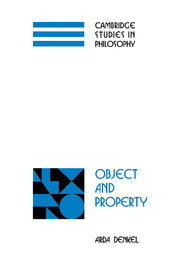Book contents
4 - Identity and individuality
Published online by Cambridge University Press: 01 October 2009
Summary
IDENTITY AND COHABITANTS
To be an individual is to be distinct from the rest of the world, and distinctness involves spatial separateness. But then, there is reason for surmising that distinctness is not the same thing as non-identity, and consequently that non-identity does not proliferate individuality. If two things are distinct individuals they are not identical, but the converse does not seem to follow. It appears that things may fail to be identical without being distinct individuals; that non-identity does not imply individuality. The reason is that non-identical things may coincide, that is, they may occupy the same positions in space and time. As has been argued by some philosophers, there seem to be good grounds for believing that an articulated object is not identical with the sum of its parts, or in other words, with the portion of matter out of which it is made: although the two ‘cohabit’ in the same place at the same time, sharing all their present actual qualities, they may differ in at least some of their historical and modal properties. I call this ‘the non-identity thesis’, for convenience. In fact, if there exist articulated objects over and above ordinary bodies or parcels of matter, then, since articulated things must be made out of portions of matter, anything such as the former must overlap with a thing of the latter category.
- Type
- Chapter
- Information
- Object and Property , pp. 71 - 92Publisher: Cambridge University PressPrint publication year: 1996



